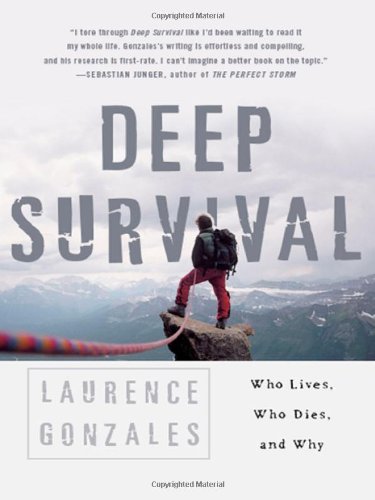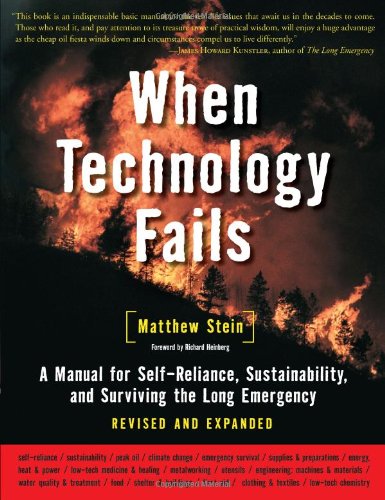
“Unique among survival books…stunning…enthralling. Deep Survival makes compelling, and chilling, reading.”—Penelope Purdy, Denver PostAfter her plane crashes, a seventeen-year-old girl spends eleven days walking through the Peruvian jungle. Against all odds, with no food, shelter, or equipment, she gets out. A better-equipped group of adult survivors of the same crash sits down and dies. What makes the difference?
Examining such stories of miraculous endurance and tragic death





Listen Up, Grasshopper,
Laurence Gonzales has written a riveting book, not about survival technique, but survival philosophy. The points he makes can be applied to any situation in which you find yourself endangered physically, mentally, or emotionally. He weaves together the tao te ching, chaos theory, musings on Roman military tactics, biological lessons on how the brain works to help us preserve the species by preserving ourselves, true-life experiences from people who have endured some of the more bizarre “accidents”, and his own taste for thrills.
Gonzales bookends the essays with the story of his father, a scientist who, as a young flier during WWII, was shot down over Germany. He FELL out of his plane–he didn’t parachute, he literally fell–and lived through a harrowing recovery as a POW.
Why did his dad make it when the rest of his crew was killed?
Some of this has to do with events you can’t control, and some of it has to do with how to control yourself so that you can find a way out of dire straits. He points out that some people can make every correct decision and end up being killed, while others make every wrong decision and walk out of the woods (or off a mountain…) unscathed. But, you can learn to THINK like a survivor, and greatly increase your chances of getting through what may seem, even to others in the same sinking boat, like a no-win situation.
Gonzales’s dad taught him, “Plan the flight. Fly the plan, but don’t fall in love with the plan.” Being prepared is only part of the equation; being able to adjust to changing circumstances is what a lot of us forget about.
Reading this book is an adventure in itself. If you’re a city dweller, like me, and don’t anticipate not having the Sears Tower in your line of sight if you get disoriented, it’s still enjoyable, and applicable to what you will eventually experience.
This book should be on every high school reading list. (Preferably BEFORE the kid takes driver’s ed.)
I also recommend Gavin DeBecker’s books, such as THE GIFT OF FEAR. He discusses some of what Gonzales does, insofar as honing your inner resources so they work FOR you, but he is also very specific regarding cases of direct threats from other people. Gonzales does discuss how non-survivors can compromise a survivor, but most of what he talks about is environmental.
If you are planning a wilderness trip or just a seemingly innocuous weekend hike, this book is a great reality check. It’s also an inspiration. Some of these stories are just amazing, and they prove how tough, and sometimes dumb, a species we are.
Was this review helpful to you?

|Simply wonderful,
Those who are focusing on whether or not Gonzales is actually instructing you on how to survive in the wild are completely missing the point of Deep Survival. As a totally urban chick who’d rather die than hike, I bought the book not because I wanted to learn about mountaineering, but to investigate why I’ve survived a blood disorder that has killed others. And thanks to this book, I’ve gotten my answer. Gonzales beautifully explains and explores the paradox that must be absorbed completely if one is to live through a catastrophe–which is that to survive something, you must surrender to it, basically fall into it, accepting all the pain and suffering, if you’re ever going to get out of it. When you’re able to quickly adapt to a new reality and make this new place–however frightening–your new home, you’ve a much better chance of surviving than the person who’s in denial. For one thing, your sense of spirituality and wonder deepens, and this is a tremendous life force in and of itself. It helps you enjoy where you ARE, instead of frantically trying to get to where you think you should be. This is simply a great life lesson, whether you’re lost in the woods, or just trying to live a happier existence.
He explains the paradox so well–that in order to survive, one must surrender, yet at the same time not give in. There must be a sheer raw determination to win the game, yet an acceptance of possibly losing it as well, which paradoxically, gives you an edge. And if you can muster a playful spirit on top of it all, well–then you’re just golden. A *great* read.
Was this review helpful to you?

|Worth hanging in there for the last third,
I really wanted to like this book. It was recommended by a friend, and is on a topic I’m very interested in. I’ve been involved in a lot of wilderness activities, have participated in rescues of myself and others, and am familiar with the literature on accidents and survival.
The author has hamstrung the book by trying to go ‘high concept’ and connect the book to chaos theory, complexity theory, and self-organizing systems. The author’s understanding of the theories is very weak, and he seriously hurts the book by trying to force connections that don’t exist and don’t add to understanding.
He finally hits his pace in the latter part of the book when he largely drops the half-baked references to chaos theory and actually grapples with the question he set out to answer: who lives, who dies, and why? I wouldn’t say his answers are unexpected, but he does a very good job of interwining well-chosen selections from survival literature with some original reporting and his personal story, and presenting them in a compelling way.
There is an excellent book hiding inside of Deep Survival. It’s a shame that you’ve got to piece it together yourself from the good bits.
Was this review helpful to you?

|